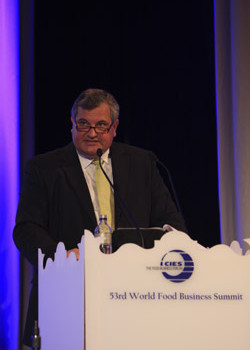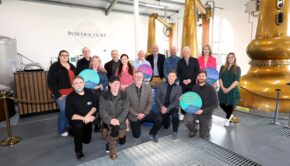End of the line

While sliding sales may have been top of mind at this year’s CIES summit, the industry was reminded why sustainability is the real bottom line
8 October 2009
The tone of the conference this year was serious and sobering, as though being confronted by the excesses of the industrialised world was a far more dispiriting experience during a recession.
The summit commenced with a reminder of the things that were top of mind last summer, when the world’s global food business leaders gathered in sunny Munich, as compared with this year’s much gloomier assembly in New York, which was enduring it’s second wettest June on record.
Corporate social responsibility and sustainability had tumbled from being the number one concern of global retailers all the way down to number five on their list. Instead, the economy, consumer demand, costs, and demographic change had leapt to number one, having been ranked only number four among last year’s priorities. Speaks volumes about corporate ‘commitment’ to sustainability.
However, at some point during the second day of presentations on ‘Ingredients for Success in Turbulent Times,’ managing director of Waitrose, Mark Price took to the stage to talk about “a little known issue of huge significance.” Price, who is also chair of the Prince of Wales’ Rural Action Programme, gave the delegation a preview of a film which is set, hopefully, to have an equal, if not greater impact on the world than ‘An Inconvenient Truth.’
The documentary film ‘The End of the Line’ underscores one simple scientific fact; all commercially fished species of open sea fish will be wiped out by 2048 if significant changes are not forced on the industries responsible. Among the facts Price threw out to the audience: 80% of the world’s fish stocks are now either fully or over exploited, or depleted; by 2003 one third of open sea fisheries were categorised as ‘collapsed,’ defined as declined to less than 10% of their original yield; up to 50% of each catch is thrown back, mostly dead; and over the past 20 years the same number of boats now have the capacity catch 50% more.
A war on the sea and we’re winning
The majority of people in the room were hearing the statistics for the first time and for those thinking ‘this can’t really be true,’ it is somewhat understandable. The whole point is that so many of us, consumers and industry decision-makers alike, are completely ignorant about the state of the global marine eco-system and furthermore, regard it with a completely different attitude from others on the planet.
This fact is highlighted by posing the following question: how would the world react if hunters lashed a net large enough to engulf 14 Boeing 747s between two trucks and dragged it for miles across the Serengeti plains, scooping up everything in its path, and a metal bar at its leading edge destroying anything that stood in its way? And what if when they had taken up their haul, they threw almost half of the dead or dying animals back in a pile on the plain, because they didn’t want them?
As a global society we have granted the Earth precious few protected areas to conserve natural eco-systems and the wildlife that inhabits them, but at least we’ve managed to do that much. According to the World Wildlife Fund (WWF) however, less than 0.6% of the world’s oceans are protected. And they are potentially one of the planet’s greatest sustainable food resources. WWF estimates that as much as 90% of world’s large fish have now been fished out, and the global fishing fleets that chase what’s left are 250% larger than the oceans can sustainably support.
We can choose to do the right thing
Quoting Charles Clover, author of the original book, Price announced: “In a single human lifetime we have inflicted a crisis on the oceans greater than any caused by pollution.” As sobering as this thought may be, the reality remains that it is still quite possible to turn the ship around. At present the so-called ‘super trawlers’ of the developed world have turned to the resources of the poorest countries, particularly in Africa, where their governments sell off their fishing rights too cheaply, and potentially leave already hungry people without a sustainable food resource they did have. What’s worse, 40% of small catch, such as sardines, is ground into fish meal to feed to farmed seafood, so it is likely that a huge proportion of the marine food basket is being doubled up to feed the same small proportion that consumes the most.
The seminally important point in all of this is, of course, that retailers can make a huge difference where an issue like this is concerned. Retailers and other decision-makers can choose to support only sustainable suppliers and boycott everything else. Furthermore, they can educate consumers and give them the information they need to make the right choices.
Waitrose was one of the first major retailers to switch all of its fish to solely sustainable supplies. This means carrying only species that are not endangered, so it replaced swordfish with mahi mahi, Mediterranean tuna with Indian Ocean tuna. It will only source from well-managed fisheries with scientifically-based quotas, and it now carries the largest range of line-caught fish. In addition, Waitrose’ fish is fully traceable to ensure that illegally caught stock is eradicated from its supply chain.
Waitrose made this shift before the masses were talking about this film, when the cause was neither popular nor well-known. They made it simply because following a business model that puts sustainability at its core means following that principle through in all aspects of the business, whether or not the issue is top of mind among the public, and whether or not the market is in recession.
Waitrose has been consistent in its sustainability policy, in sustaining its business model that prioritises its employees, and maintaining a supply base that prioritises sustainability rather than profit. Fiscal results posted this year showed the retailer took a severe hit in operating profit (-18%) but its sales were up and it retained the loyalty of its customers. In the long run, Waitrose’s model is a sustainable business model.
Corporate responsibility
There is a business case to be made for sustainability but, more importantly, there is a business case to be made for responsibility. Another highlight of the conference was Indra Nooyi, chairman and CEO of Pepsico, who articulated perfectly the dynamic between multinationals and society: “Companies receive a licence from society to trade and therefore they have a duty of care to society.”
While the Indian-born CEO was articulate about most subjects, this resonated most strongly, and certainly with this Irish delegate. It was heartening that the subject of sustainability and corporate responsibility had not been glossed over this year in deference to the ‘current climate’ and demands of the balance sheet during ‘challenging times.’ There should not be an opt-out for large multinationals that have been granted that licence; they should bear the responsibility to, at the very least, leave the society they entered the way they found it, if not enhanced for future generations.
As Andrea Debbané, vice president of strategy and communications at Airbus, said at last year’s much sunnier event, industry leaders should lead the charge in ‘doing the right thing,’ not just because it is the right thing to do, but because failing to will result in having something else imposed on you. Society gives the licence, companies bear the responsibility, and it’s up to both to turn the ship around before it’s too late.
“Do better by doing better.” Indra K Nooyi, chairman and CEO of Pepsico, gave her company’s three steps towards being a better corporate citizen: (1) A five-year plan to transform Pepsico’s portfolio by increasing the ‘healthfulness’ of the products; (2) setting aggressive targets to become environmentally neutral within a set time-frame; (3) having a ‘people agenda’ and creating a corporate environment that is multinational, gender-balanced and multi-generational, to truly support diversity and inclusion.
Professor Bob Watson, chief scientific advisor, DEFRA (UK Department of the Environment, Food and Rural Affairs) explained why the price of food and water can only go up not down. Chief among the reasons is that demand on food resources is increasing, energy costs are ultimately rising, and water is becoming scarcer. Key for the safeguarding the food chain in future: “Farmers need to make a profit and produce food sustainably.”
Justin King, chief executive of Sainsbury, debunked three recession-time myths: that consumers always downtrade, that they revert to “selfish behaviour,” and that the middle ground erodes. King revealed that the surge in consumer interest in provenance and ethics since the last major downturn has not abated, but that “shoppers are scrutinising value, but they are not compromising their values.” Consequently, Sainsbury has remained faithful to its core values and continued to prioritise British produce, particularly bacon, for which it is traditionally known. Sainsbury saw an uplift of 300% in high husbandry meat in the last quarter.



 Print
Print






Fans 0
Followers